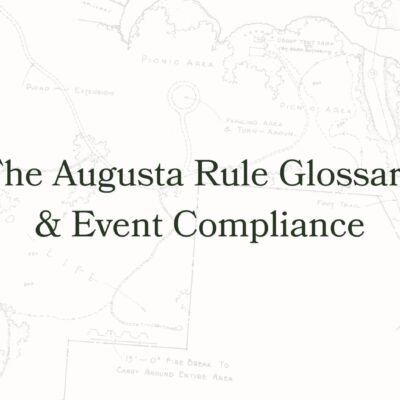
Resources
What is the Augusta Rule?

Ever heard of the Augusta Rule?
Not our brand or website. The actual Augusta Rule.
The Augusta Rule is a tax rule that allows a property owner to rent out their residence for 14 days (or less) per year without paying taxes on the rental profits. It’s not a loophole. It’s not tax evasion. It’s a legitimate part of the tax code, described in IRC Section 280A(g).
But before you rent out your home on AirBnB, let’s discuss basic law and a better way.
First, “residence”, for the purpose of the Augusta Rule, is defined by the IRS as a property in which you sleep for at least 14 nights per year, and contains a bedroom, a bathroom, and a kitchen.
Second, if you rent out the property for more than 14 days in a calendar year, all of the rental income for that year becomes taxable, including the income from the first 14 rental days.
Third, you can rent out each residence for up to 14 days a year – tax-free. In other words, you’re not limited to 14 cumulative rental days across all your properties, you can rent out each of your residences for up to 14 days each, tax-free. For example, if you have a primary residence and two other homes that qualify as residences, then you could rent three homes for up to 14 days each, for a total of 42 tax-free rental days.
At this point, you might be wondering, “That’s great. How does this affect me as a business owner?”
Business owners may benefit twice from the Augusta Rule. But in IRS-world extra benefits often mean extra rules. That’s where our “Free Money” Plan comes in.
Let’s lay it out. If you, the eligible business owner, rent your residence to a friend or a stranger (a la AirBnB), you earn tax-free income. But if you rent out your residence to your business for legitimate business purposes, you earn tax-free income and get to write off the rental fee that your business pays you.
To figure out if your business is eligible for this application of the Augusta Rule, see business types below.
Eligible
- S corporations and C corporations
- Multi-member LLCs (non-spousal)
- Non-Spousal Partnerships with a distinct EIN
- Single-member LLCs taxed as S-corps or C-corps
Gray
- LLCs comprised of a married couple
- Partnerships comprised of a married couple
Ineligible
- Sole proprietorships
- Standard single-member LLCs
In order to make your business activities defensible in an IRS audit, we require that at least 3 people participate in them, that real topics are actually discussed, and that good notes are taken (AI makes such note taking easy). The tax code does not directly require such “real” meetings – but the case law does, and our tax attorney is only willing to defend meetings done the right way. Unwise promoters may tell you what you want to hear: A meeting with your spouse or even alone, just “on paper”, with minimal substance, and no real notes is easy (true) and “good enough” (not true). We are here to tell what is likely to actually work and not just what so many want to hear. What does it take to use the Augusta Rule with my business, legitimately?
You can probably guess that renting a residence to your business isn’t as simple as making some business calls from your kitchen, then paying yourself a rental fee. I’s need dotted and T’s need crossed – “because the IRS”. Otherwise, you’d lose in an audit. We’ll show you how to minimize the odds of a loss. And how to not live in fear of an audit.
1. The rental needs to be for a legitimate business event.
In other words, you can’t just have dinner with your co-owner spouse, talk no business, pay yourself a rental fee, and take the income tax-free.
2. You need to maintain certain forms and documentation.
If you cannot prove that you followed the rules… then you didn’t follow the rules. The IRS requires very specific documentation..
3. You must charge your business a fair rental fee.
Study the going rental rates in your area and match them. Because you can bet that in an audit, the IRS will look at true rental rates and not fantasy numbers..
Is the Augusta Rule worth the work?
It might seem as if there are plenty of opportunities to make mistakes when using the Augusta Rule. Perhaps it costs thousands of dollars to work with a specialized tax attorney? (It did for me) But not for you. Perhaps it’ll take days and days of AI searches to learn enough about the Rule to confidently leverage it – assuming that the AI doesn’t hallucinate based on its source, the internet, home of TMI and GIGO. Worried about insufficient documentation, lost paperwork, or inaccurate rental values? Rightly so.
Which is why we launched our “Free Money” Plan
The Augusta Rule™ was founded by Nethaniel Ealy and John Hyre. John is a tax attorney with 30 years of hands-on experience. Nethaniel is a serial entrepreneur who applies the Rule himself and has learned to use it, effectively and efficiently. Together, Nethaniel and John have created a software-backed system for automating the Augusta Rule that will:
- Protect you from audit
- Increase your tax-free income
- Save you time and money
- Reduce the chances of mistakes
With The Augusta Rule™, you get a complimentary 45 minute strategy call and requires less than three hours of work for the entire year from one of your team members. After the call, you pay a $1,000 setup fee to get started, which is credited toward the eight percent fee on the deductions we help you create. Your plan also includes Audit Defense as part of the “Free Money” Plan.
We’re here to get you properly educated, efficiently, minus the TMI & GIGO. And if you want to just skip to the part where we do the work and you actually make money… book your call today.









